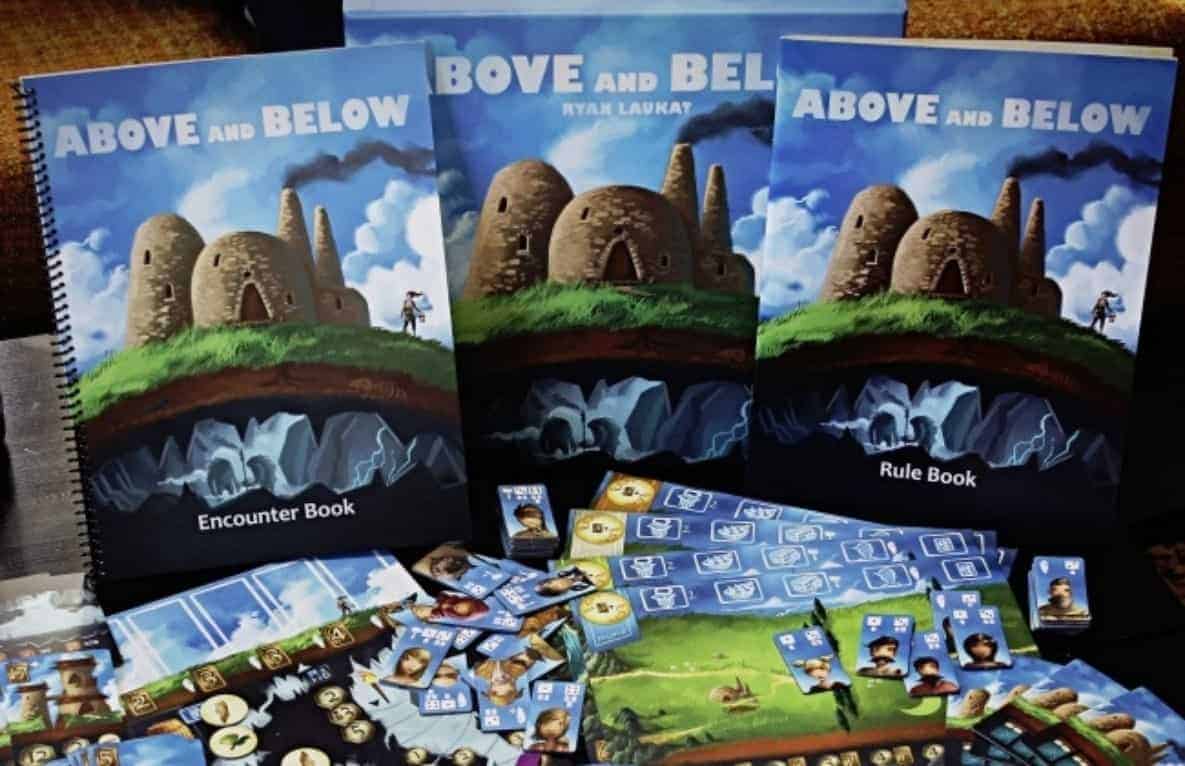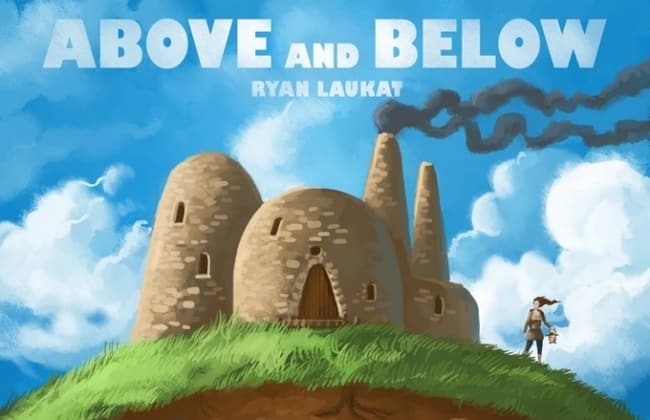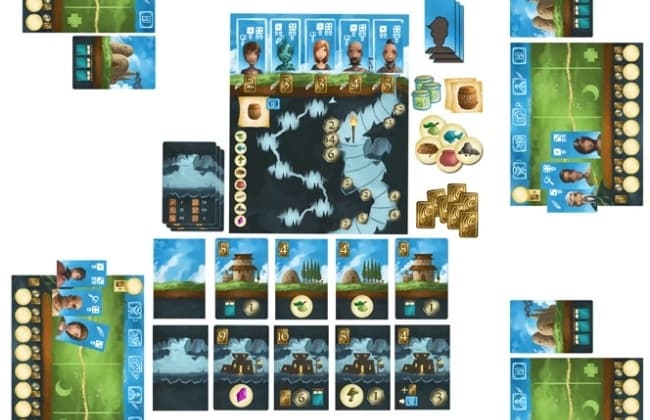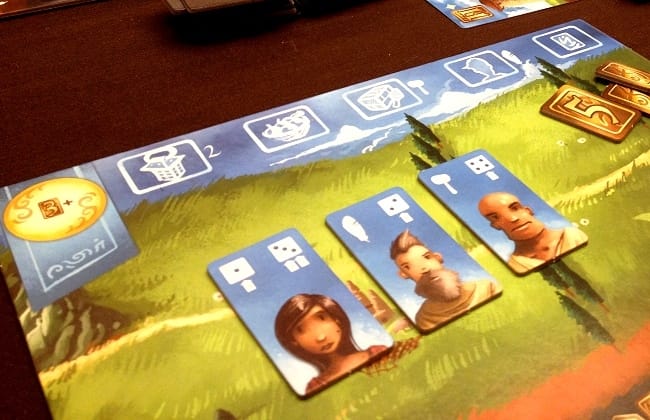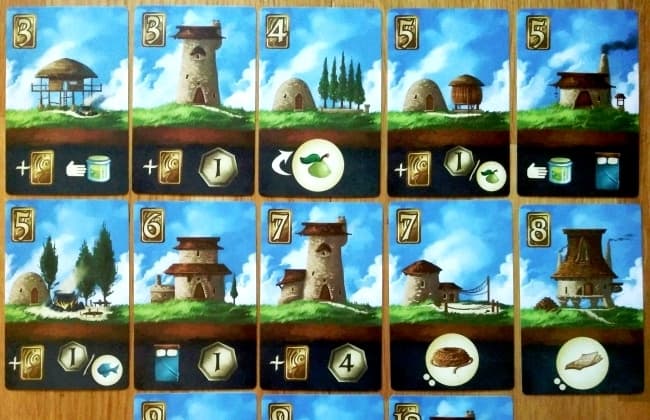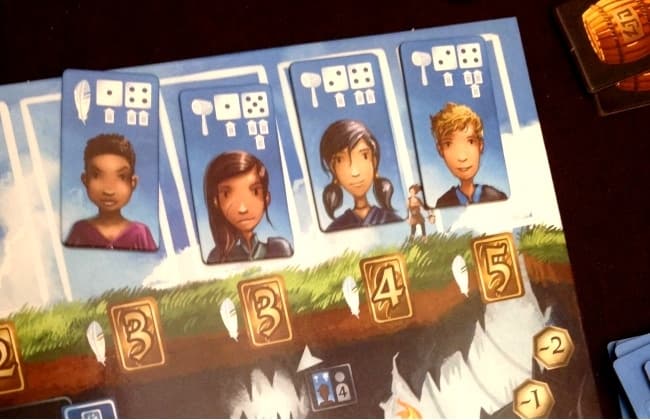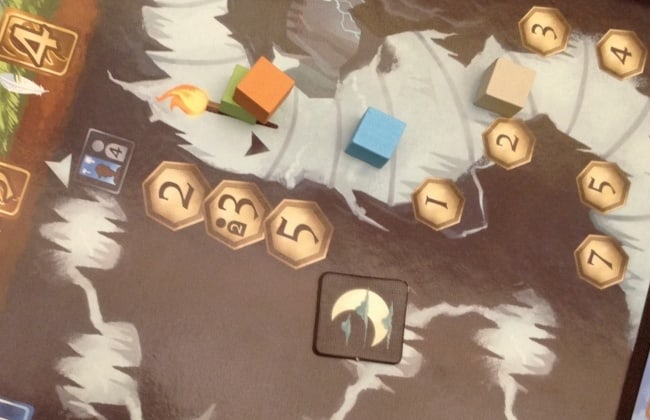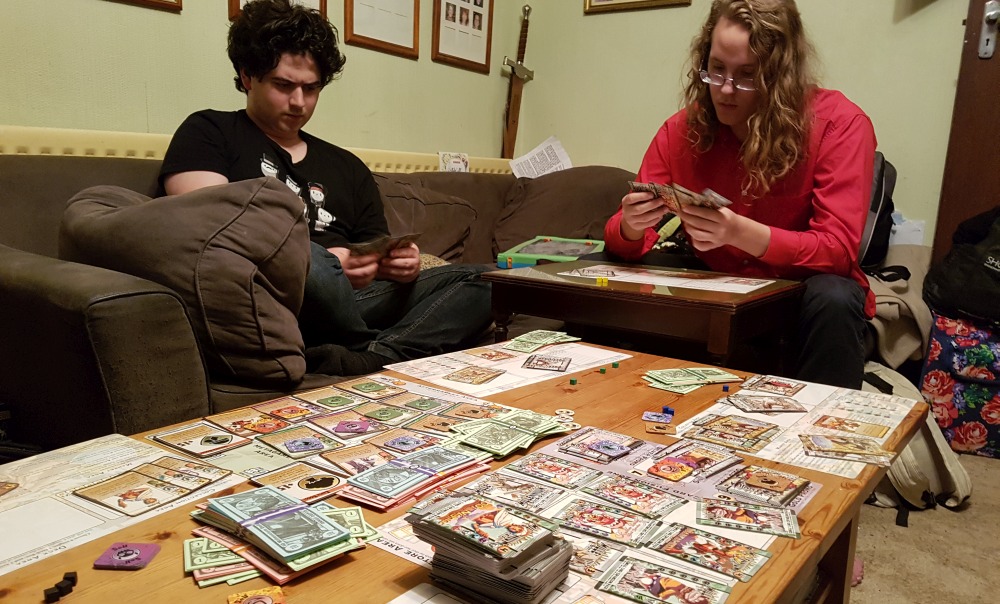Paul: I saw a curious mix of games at this year’s BGGCon, from hard euros to simple set collection games to the rising tensions of Win, Lose, Banana Legacy.† Of all the many things I saw while hiding from the baking Texas sun in the cavernous, subterranean depths of Dallas Fort Worth’s Hyatt Regency, Above and Below was my favourite. Appropriately, it was my underground adventure.
Also, it gave me a chance to try out a Pear Strategy. I went Full Pear, All Out Fruit, and didn’t do too badly for it, either. I quested, I recruited, I constructed and then I made all my money from Big Pear. Meanwhile, my friends hired adventurers, fought bandits and found the legendary Moss King. All in a day’s work.
It’s said that the most common way to pitch screenplays in Hollywood is to begin by stating “It’s X meets Y,” to show your game as a marriage of established and proven ideas, a bawling baby born of the finest stock. When I first saw Above and Below, I thought “Hey, this is sort of like Dungeon Lords,” and immediately cast my mind back to Vlaada Chvátil’s kooky game of overlord economics, but I think a far better description is Caverna meets Arabian Nights.
Lighten those two games, though. In fact, cut them way back. Drive back and forth over them with a lawnmower until you get a sleeker, neater and thoroughly pruned product. Make it prettier. Add more mushrooms. You’ve created Above and Below.
The sunny side of the game has you building and populating a village, by drawing cards and tokens from a central pool and aiming to score points by expanding, amassing goods and generally behaving nicely. You start with just three villagers and it’s no coincidence that you also start with just three beds. Each villager has a particular specialisation, which might be recruitment (they can go into town to find more villagers), construction (they can make buildings) or some degree of adventuring ability. We’ll get back to adventuring in a moment, because that’s not for the faint of heart.
But if you, like me, have the very faintest of fluttering hearts, you’re going to start with something safer, with shaping your pastoral paradise. Perhaps you’ll reach for a building that simply gives you money, because everything sure is pricey in this world. Perhaps you’ll reach for the pear farm (take my advice and reach for the pear farm). Perhaps you’ll reach for a something with nice, comfy beds inside, because providing smooth and soft down is the true path to victory.
No, really. You see, once one of your workers has fetched a friend, grabbed a building or enjoyed their first day of work on your new pear farm, they get tired. Tired workers need to go to bed. I don’t know what sort of goings on take place in your town, but here, our workers sleep one per bed. If your worker can’t rest, they’re not fit for purpose next turn.
So far, so fair. There’s enough there already to keep you quite busy and you’ll want plenty of workers, beds and resources. Some resources are simply better than others and while mushrooms are a dependable thing, they’re not nearly as exciting as ore, or paper, or sexy amethyst. If you want to make money (and you do), you should strive for better, for more.
It’s all very safe, too. There’s hardly any player conflict, which is mostly confined to grabbing villagers or buildings before anyone else does. Your own holdings are safe from outside interference and the competition, which not everyone will like, really comes from watching what your opponents are doing and trying to outperform or subvert them. To preemptively strike for their pear farms.
Sooner or later you’ll tire of all this travail, knowing full well that there’s so much more to life. While a mushroom farm is fine, while crafting pots is a reliable living, there’s a whole world out there, down there, waiting to be discovered. So you send off some explorers. Each of your villagers has a number of lanterns on their token, along with at least one number, which is their Explore rating, just as long as you can roll the corresponding number. While other skills or resources are sometimes useful when poking around underground, the main thing you’ll care about is that Explore rating.
So you draw a card off a pile, roll a die and receive a paragraph number. This is where things get all Arabian Nights. This is where you open up the great big adventure directory and thumb through it to see what you find. Inevitably, there’s a challenge of some sort and a decision to be made.
There’s a bandit (damn that bandit!). There’s a friendly witch. There’s a map fragment. Do you fight? Talk? Steal? Whatever you find and whatever choices you’re presented with, your Explore rating is critical. Want to fight those bandits? You’ll need to achieve at least Explore 5. Investigate that labyrinth? That’s Explore 3. Perhaps you already score that because you took a bunch of capable villagers along, shirking other responsibilities, or perhaps you need to roll several dice, cross several fingers and hope you can get the result you need. It’s always a simple push-your-luck dynamic, often with unknown rewards littered throughout those hundreds of paragraphs. Exploring is gambling, plain and simple, but for an extra edge you can injure your explorers, push them to their limit to achieve higher results, knowing they’ll return home ruined and in need of healing potions. A simple night’s rest won’t be enough.
It’s worth it though. There are hundreds of paragraphs of possibilities, offering all sorts of surprises and some remarkable rewards. Exploring also opens up underground caverns, special spaces in which you can build different structures for a more diverse village. If you make kind choices on your travels, a Reputation meter ticks its way up, granting you extra points at the end of the game for your good behaviour. As you might’ve guessed, a crueller and more mercenary attitude harms your reputation, but it can also bring considerable wealth.
Above and Below isn’t a game for players who want to fight. It’s not about facing off against your opponents, crushing their villages and killing their adventurers. It feels more like everyone else is playing in parallel, rather than against you, making judicious choices very important and encouraging you to take risks whenever you can. This does mean your fate is in some part tied the randomness of cards and dice rolls, but it also means it’s gentler and more playful than most of the eurogames it draws influence from, a colourful gentleness that reminded me of Tokaido.
And I loved this. I loved flipping through that big book of adventures, adding another underground chamber to my village, recruiting another cute villager to join my disparate adventuring party or simply to stay home and make valuable hemp. Above and Below is so damn homely and now I miss it. Now I want to return to it and try a different strategy. Now I want to play it again and this time, this time, I’ll beat that blasted bandit.
†Listen out for that one on our podcast…!

